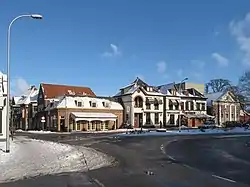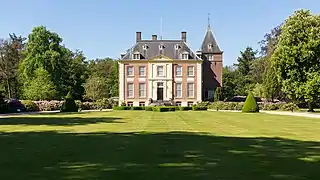Lochem | |
|---|---|
City and municipality | |
 City centre of Lochem | |
 Flag Coat of arms | |
.svg.png.webp) Location in Gelderland | |
| Coordinates: 52°09′41″N 6°24′55″E / 52.16145°N 6.41519°E | |
| Country | Netherlands |
| Province | Gelderland |
| Government | |
| • Body | Municipal council |
| • Mayor | Sebastiaan van 't Erve (GL) |
| Area | |
| • Total | 215.94 km2 (83.37 sq mi) |
| • Land | 213.03 km2 (82.25 sq mi) |
| • Water | 2.91 km2 (1.12 sq mi) |
| Elevation | 14 m (46 ft) |
| Population (January 2021)[4] | |
| • Total | 33,948 |
| • Density | 159/km2 (410/sq mi) |
| Demonym | Lochemer |
| Time zone | UTC+1 (CET) |
| • Summer (DST) | UTC+2 (CEST) |
| Postcode | 7210–7218, 7240–7245 |
| Area code | 0573, 0575 |
| Website | lochem |
Lochem (Dutch pronunciation: [ˈlɔxəm] ⓘ) is a city and municipality in the province of Gelderland in the Eastern Netherlands. In 2005, it merged with the municipality of Gorssel, retaining the name of Lochem. As of 2019, it had a population of 33,590.
Population centres

The city of Lochem is the municipality's main population centre. The hamlet of Barchem and Laren were already comprised in the municipality of Lochem before 2005. Formerly in the municipality of Gorssel, Almen, Eefde (immediately north of Zutphen), Epse and Gorssel itself became part of the municipality of Lochem, as well as the hamlet of Harfsen.
City of Lochem
Lochem, 18 km (11 mi) east of Zutphen, received city rights in 1233.[5] Until the 17th century, it was often besieged and burnt down. After 1700, it became a small market town for the farmers in its surroundings.
The village of Laren has a castle called Huis Verwolde. In summer, guided tours of this castle are organised for tourists. On its estate there is a tree, said to be the thickest tree in the Netherlands ( "de dikke boom van Verwolde").
Transport
Lochem is served by Lochem railway station, on the Zutphen–Glanerbeek railway.
Notable people
- Johan van Dorth (1574 in Salvador – 1624), schout of Lochem and nobleman and general of the Dutch Republic
- Robert Jasper van der Capellen (1743 in Eefde – 1814) a scion from the noble regenten family Van der Capellen from Guelders
- Carel de Villeneuve (1897 in Lochem – 1974) a lawyer and director of business associations in colonial Indonesia during the 1920s–1940s
- Hans Jorritsma (born 1949 in Lochem) a retired field hockey player, competed at the 1976 Summer Olympics
- Irma Boom (born 1960 in Lochem) a Dutch graphic designer—who specializes in book making
History
Lochem received city rights in 1233 from Count Otto II of Guelders. It was a fortified town that was often besieged and burned down by various enemies, such as the Bishop of Utrecht, the Duke of Burgundy, and the Spanish troops.
Lochem played a role in the Eighty Years’ War, resisting several attempts by the Spanish to capture it. In 1590, a local hero named Jan de Poorter foiled a plot by the Spanish to enter the city disguised as hay wagons. After 1700, Lochem became a small market town for the farmers in its surroundings. It also developed some industries, such as leather, tobacco, and paper. Lochem was occupied by the French from 1795 to 1813, and suffered from plundering and requisitions. In 1818, Lochem became part of the newly formed province of Gelderland.
In 1763, Lochem experienced the "Night of Fire" on Christmas. A group of young Germans ignited the church and numerous significant buildings.
Lochem boasts various historical landmarks, including the St. Gudula Church, originating from the 11th century and housing a renowned organ from 1834. The town features a museum, a theater, and a music venue. Laren, a village within the Lochem municipality, is home to Huis Verwolde Castle, erected in 1776 and available for public viewing. Lochem is nestled amidst stunning natural landscapes of forests, hills, and open fields, making it a sought-after spot for activities like hiking, cycling, and golfing.
Gallery
 Former town hall
Former town hall De Gudulakerk
De Gudulakerk Monumental street light
Monumental street light De Witte Kerk
De Witte Kerk Monumental house on the Markt
Monumental house on the Markt House at 't Ei
House at 't Ei River Berkel from De Graaf Ottoweg
River Berkel from De Graaf Ottoweg Bicycle bridge across the Berkel
Bicycle bridge across the Berkel Zwiep, windmill: de Zwiepse Molen
Zwiep, windmill: de Zwiepse Molen Lochem, artwork and bridge across Twentekanaal
Lochem, artwork and bridge across Twentekanaal Huis Verwolde
Huis Verwolde Lochemse Berg, trees in the fog on the Hoge Enk
Lochemse Berg, trees in the fog on the Hoge Enk
References
- ↑ "Burgemeester van 't Erve" [Mayor van 't Erve] (in Dutch). Gemeente Lochem. Archived from the original on 21 December 2014. Retrieved 17 June 2014.
- ↑ "Kerncijfers wijken en buurten 2020" [Key figures for neighbourhoods 2020]. StatLine (in Dutch). CBS. 24 July 2020. Retrieved 19 September 2020.
- ↑ "Postcodetool for 7241AA". Actueel Hoogtebestand Nederland (in Dutch). Het Waterschapshuis. Archived from the original on 21 September 2013. Retrieved 17 June 2014.
- ↑ "Bevolkingsontwikkeling; regio per maand" [Population growth; regions per month]. CBS Statline (in Dutch). CBS. 1 January 2021. Retrieved 2 January 2022.
- ↑ "Stad Lochem", Mijn Gelderland. Retrieved on 14 April 2017.
External links
 Media related to Lochem at Wikimedia Commons
Media related to Lochem at Wikimedia Commons- Official website
